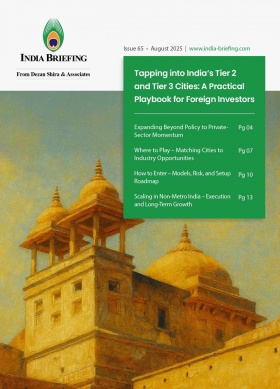China Bans Third-Party Export Documents: Advisory for Indian Importers
From October 1, 2025, China enforces STA Announcement 17, banning third-party export documents. Indian importers must adapt sourcing strategies, verify suppliers, and ensure full compliance. For business inquiries or more information, please reach us at: India@dezshira.com or China@dezshira.com
Overview
On July 7, 2025, China’s State Administration of Taxation (STA) issued Announcement No.17 [2025] on optimizing corporate income tax (CIT) prepayment. Taking effect from October 1, 2025, this reform significantly tightens compliance for export enterprises by ending the practice of using third-party export documents (买单出口).
For Indian importers, this marks a decisive shift in how goods will be exported from China. Buyers must prepare for stricter real-name supervision, direct tax reporting by actual manufacturers, and reduced tolerance for informal or agent-led export models.
What Indian importers need to know
The end of “buying third-party export documents”
Traditionally, many small Chinese factories without export licenses relied on trading companies or logistics agents to ship goods under borrowed credentials. This workaround is no longer viable.
- Under the new rules, the declared exporter must match the actual cargo owner.
- Any misrepresentation risks violating China’s Customs Law, tax rules, and foreign exchange controls.
- Agents who conceal the real exporter will now bear full tax liability on the export value.
For Indian buyers, this means that suppliers who previously exported through such arrangements will no longer be able to do so. Importers must confirm their Chinese partners’ export qualifications or risk shipment delays, higher costs, or compliance breaches.
Why China is enforcing the change
The old model created compliance gaps:
- Mismatch in exporter identity led to misreporting under customs law.
- Tax evasion risks, with both agent and manufacturer omitting taxable export revenue.
- Foreign exchange violations, where overseas payments did not align with declared customs records.
These issues compromised regulatory transparency and were exploited in tax fraud cases. The STA’s reforms close this loophole, ensuring exports are traceable to the real producer.
Key provisions of STA Announcement No.17
Income classification
- Self-operated exports: The manufacturer/exporter must declare full export income.
- Entrusted exports: The actual producer (entrusting party) declares export income, while the agent only reports service fees.
Agent exporter obligations
- Agents must now submit transaction-level data, including:
- Name of the actual exporter
- Unified Social Credit Code (USCC)
- Export amount and declaration number
- If agents fail to report accurately, they will be taxed as if they are the exporter on the entire transaction.
Compliance in practice
- In standard entrusted exports, the manufacturer declares export income while the agent only reports fees—this is compliant.
- In multi-layered agency chains, the STA requires direct disclosure of the true producer. Misreporting shifts the tax burden entirely to the agent.
Impact on Indian importers
1. Working with Chinese suppliers
- Suppliers without export licenses can no longer rely on document-selling agents.
- Indian buyers must ensure their partners either:
- Export under their own name, or
- Use entrusted arrangements where the actual producer is correctly disclosed.
2. Cost and documentation alignment
- Importers may face higher costs as logistics companies restructure their models or increase fees to cover compliance risks.
- Indian buyers should expect more documentation requests to ensure consistency between customs declarations, invoices, and foreign exchange receipts.
3. Dealing with cross-border e-commerce sellers
- Some logistics intermediaries are refusing shipments from sellers unable to meet new compliance requirements.
- Importers sourcing via e-commerce channels must confirm that sellers have aligned their export declarations with foreign exchange receipts to remain rebate-eligible.
4. Freight forwarders and logistics partners
- These companies must now verify the identity of the real exporter.
- If they fail, they risk being taxed as exporters themselves.
- Indian importers must work only with forwarders who comply with these reporting standards.
5. Direct impact on overseas buyers
- Importers may now need to provide detailed information about the actual Chinese exporter.
- Options for Indian importers:
- Require suppliers to export goods under their own name.
- Insist that trading agents disclose the real manufacturer in entrusted exports.
- For larger Indian firms, consider establishing a local entity in China to export directly under their own name.
Action points for Indian importers
- Audit supplier compliance
- Confirm that your Chinese suppliers hold valid export licenses or are prepared for entrusted export reporting.
- Review contracts
- Ensure that agreements with agents or forwarders require disclosure of the actual exporter’s identity.
- Prepare for documentation requests
- Be ready to share supporting documents that align payments, customs declarations, and invoices.
- Budget for higher costs
- Some brokers and forwarders may raise service fees to offset tax risks. Factor this into procurement planning.
- Consider a local presence in China
- Larger importers may find value in setting up a local entity to directly control export compliance and documentation.
Conclusion
China’s STA Announcement [2025] No.17 fundamentally reshapes export compliance by eliminating informal export channels and mandating real-name reporting. For Indian importers, this means stricter documentation, closer scrutiny of suppliers, and potential cost adjustments.
To maintain smooth supply chains, Indian buyers should proactively engage with their Chinese partners, restructure contracts, and ensure compliance with the new regime. Early action will help avoid disruptions and preserve long-term sourcing relationships in China’s evolving regulatory landscape.
(This article is adapted from our sister platform, China Briefing. To learn more, read here: New Tax Filing Rules Reshapes Export Compliance in China Starting October 1)
About Us
India Briefing is one of five regional publications under the Asia Briefing brand. It is supported by Dezan Shira & Associates, a pan-Asia, multi-disciplinary professional services firm that assists foreign investors throughout Asia, including through offices in Delhi, Mumbai, and Bengaluru in India. Dezan Shira & Associates also maintains offices or has alliance partners assisting foreign investors in China, Hong Kong SAR, Vietnam, Indonesia, Singapore, Malaysia, Mongolia, Dubai (UAE), Japan, South Korea, Nepal, The Philippines, Sri Lanka, Thailand, Italy, Germany, Bangladesh, Australia, United States, and United Kingdom and Ireland.
For a complimentary subscription to India Briefing’s content products, please click here. For support with establishing a business in India or for assistance in analyzing and entering markets, please contact the firm at india@dezshira.com or visit our website at www.dezshira.com.
- Previous Article GST Reforms in India: How Foreign Companies Can Prepare
- Next Article Compliance Advisory: How Indian Firms Can Qualify for RCEP Benefits in Vietnam












